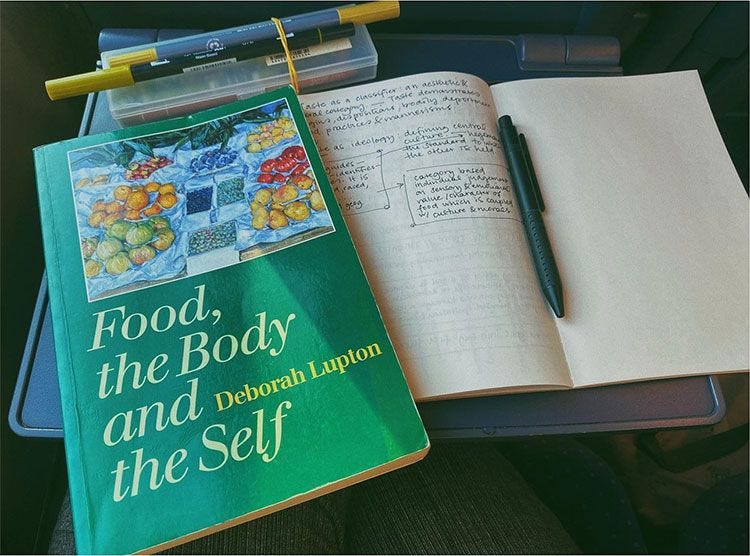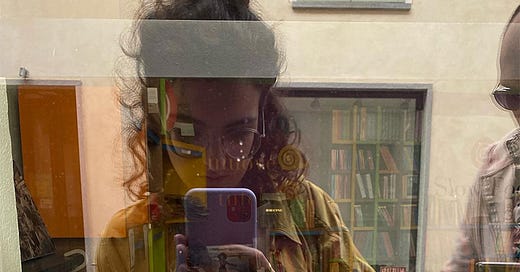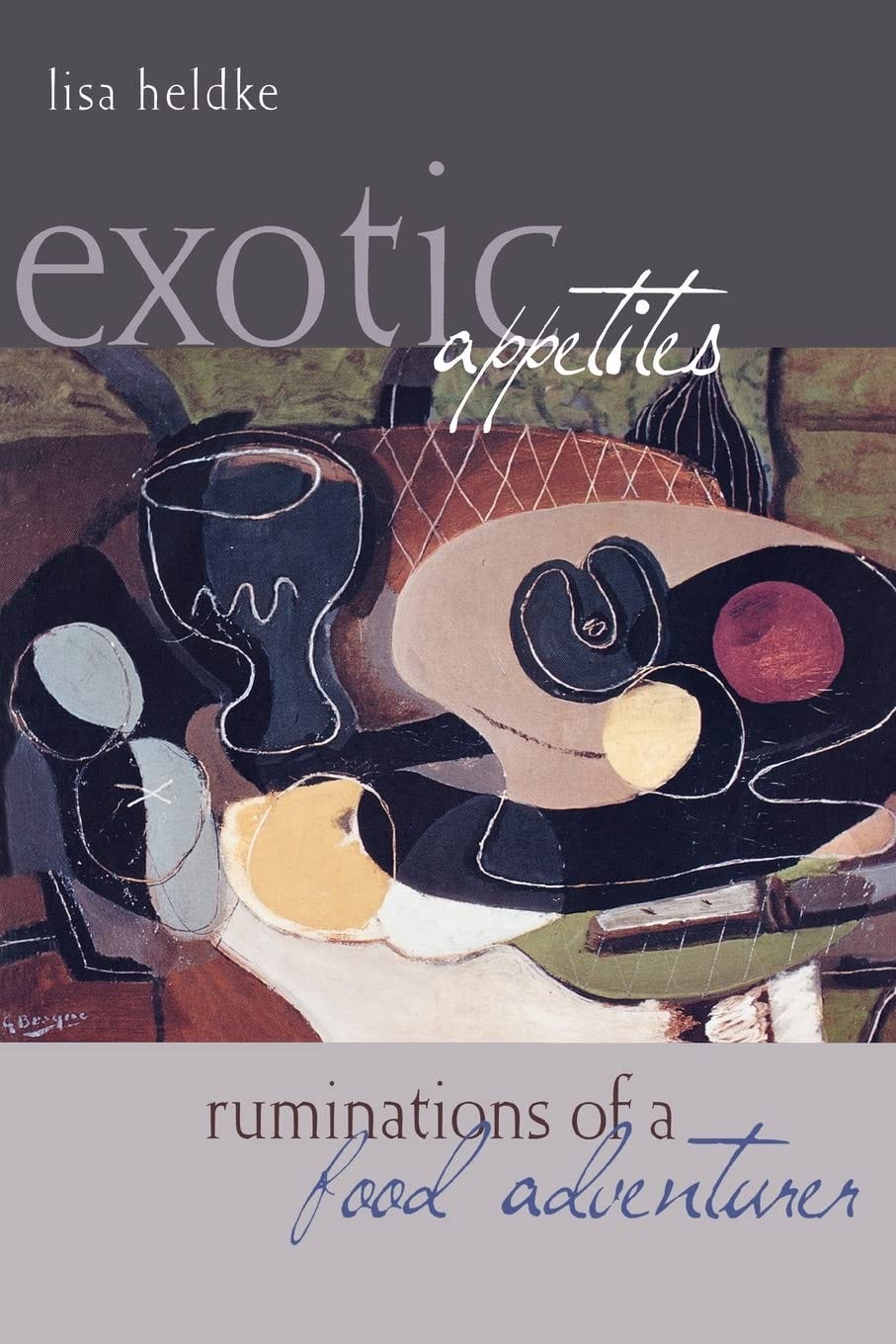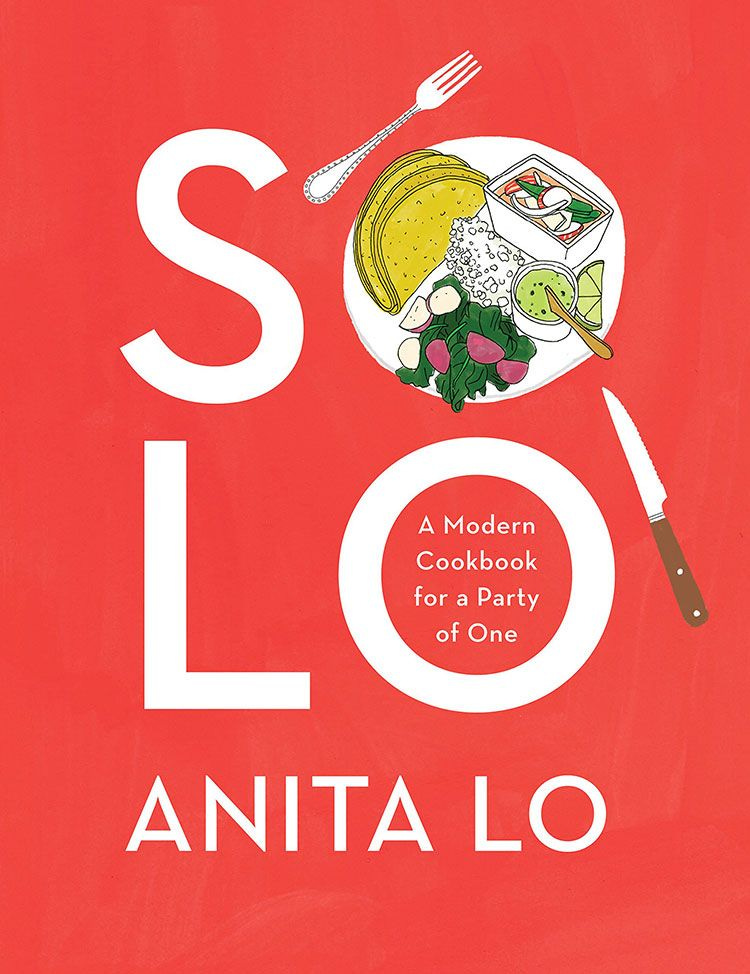#63 [Interview] Les recos d'Alkim Kutlu, une chercheuse en food studies
Avec plein de recommendations d'essais en VO sur la cuisine
On vous a transféré ce message ? Abonnez-vous pour recevoir les prochaines newsletters !
Hello tout le monde !
On fait un petit pas de côté avec l’interview d’aujourd’hui, comme Alkim n’est ni cuisinière, ni autrice culinaire… Mais chercheuse en food studies ! Née en Turquie, elle enseigne aujourd’hui à l’université de Düsseldorf, où elle réalise aussi son doctorat sur le sujet de : “The Sensory Experiences and Cultural Politics of Food and Travel Shows”. Vous pouvez découvrir son travail ici.
Et pourtant, ce n’est pas via son travail académique que je l’ai rencontrée, mais, vous vous en doutez, grâce à la plateforme magique. Instagram, évidemment ! Entre deux jolies publications de cuisine au quotidien, elle partage régulièrement d'excellentes recommandations de livres sur la cuisine et la nourriture, que ça soit des essais, des revues ou des livres de cuisine vintage.
Et donc, après avoir échangé en DM depuis plus d’un an, j’ai proposé à Alkim de participer à cette rubrique, avec sa double casquette de chercheuse et de cuisinière amatrice. C’était aussi la première fois qu’on se parlait de vive voix, et je regrette que vous ne puissiez entendre, comme moi, tous les sourires que je parvenais à percevoir à l’autre bout du fil 😊
Je vous ai remis notre échange en anglais - désolée si mon mauvais anglais fait pleurer des larmes de sang aux anglophones 😅
Vous pouvez aussi lire une version en VF ici.
*Notre conversation a été éditée pour plus de clarté.
First, could you tell me more about your academic background and how you came into food studies?
I started with English and American literature, but I thought there were a lot of interesting things about food in fiction and non-fiction that were not discussed in my classes. It’s not just only about cooking: food also has a cultural significance, with many gender, race or class-related connections, so I wanted to pursue that. And I also love to cook and eat 😄
So I moved from literature studies to cultural studies: in my BA, I wrote a thesis titled "Feeding the Immigrant: Food as a Cultural Symbol in East Asian American Drama”. And in my MA, I studied literary cookbooks written by artists, writers and philosophers. For example, my work was based on Filippo Marinetti’s The Futurist Cookbook (VF) Maya Angelou’s Hallelujah! The Welcome Table and John Keats's Porridge: Favorite Recipes of American Poets, which I also advise not only from a scholar perspective, but also if you enjoy cookbooks.
Now for my PhD, I focus on television, and how food reaches the audience through this medium.
So what book do you want to advise us ?
First, I’d like to share a book that I’ve loved reading, but that I also had my students read quite often: Exotic Appetites: Ruminations of a Food Adventurer by Lisa Heldke.
A lot of things said in the book talked to me. It demonstrates how we can consider our culture as “natural” or the centre of the world, and everything else as being “different”. It also addresses people who seek excitement in their food habits, and how being a “food adventurer” can actually be a colonial thing.
Many books have dealt with this subject, but this one is particularly interesting because it doesn’t read too much like an academic book. It’s actually personal and self-questioning as well: alongside her reflections, the author, who comes from a philosophical background, shares a lot of personal interrogations about her own practices as a white woman from the (Mid)West.
And as for my work, it’s a book I like to share with my students, not only for the class, but also for them personally, so that they can start to think about their food habits: “Ok, I love Korean food now, but why do I love it? And how am I doing it? Am I doing it in a respectful way?” It allows for a more inclusive approach to food.
This is a book that you advised a lot to your students. On the other hand, is there a book or an article that your students really enjoyed ?
Yes, I think of one article that my students voted as their favourite text during a course I taught. The title is: “Lose Like a Man: Gender & the Constraints of Self-Making in Weight Watchers Online” by Emily Contois. A lot of the students hadn’t noticed how gendered weight loss is. I mean, they knew that beauty standards are harsher for women. But they didn’t realise to what extent the messages sent to women and to men could be so different on the same website and for the same program. Diet culture is also a subject we’re all familiar with, so it was interesting for them to deconstruct it and look deeper in the gender stereotypes linked to it.
[Aparté revue de food studies]
Pour ceux et celles qui seraient intéressé(e)s par la lecture d’articles en food studies, Alkim vous recommande volontiers la publication d’où est tiré l’article, Gastronomica: The Journal of Critical Food Studies. Elle précise que la revue ne comprend pas seulement des papiers universitaires, mais aussi d’autres formats comme des articles d’opinion, ce qui la rend plus digeste (pun non intended !) pour le grand public. Si vous avez accès à des bibliothèques numériques façon JSTOR, c’est très bien. Mais sinon, j’ai vu qu’on peut commander des numéros et/ou s’inscrire à la revue directement sur le site de l’université - et c’est moins cher que je ne l’aurais cru.
Sinon, petit conseil d’Alkim, elle vous recommande d’envoyer directement un mail aux chercheurs et chercheuses si vous êtes intéressés par un de leurs articles. “A lot of people happily share their work, because research is supposed to be for everyone.” On a envie de la croire :)
Is there a particular book that left a mark on you during your studies ?

One book really struck me and shaped my research. It’s Food, the Body and the Self by sociologist Deborah Lupton. It’s the kind of book the minute you read it, you’re like “ahah! I knew this, but I never thought of it.” There’s one particular chapter that talks about disgust, which we always think of as related to our own body, something very individual. But the book shows how distaste is shaped by external influences, how everything we’ve learnt culturally and socially while growing up kind of stays within our body. It’s a fascinating book.
And to finish, could you advise one or two cookbooks that you enjoyed cooking - but not necessarily studied?
There’s A Recipe for Cooking by Cal Peternell, that I’ve recently found second-hand.
The book contains seasonal recipes, so it’s divided into 4 chapters. And actually, I’ve used this book almost all winter ! We tried most of its winter recipes.
I liked how tasty it was. For example, a lot of recipes replace potatoes with celery or different root vegetables, but in a way that makes sense. I also liked the fact that there were a lot of lighter dishes. It’s not because it’s winter that it should be only about stews or heavy dishes. The book also offers fresh dishes, salads, with a lot of citrus which i love. And even though there were a lot of steps, it was really clear to follow the recipes.
I’d also like to share a book that was first recommended to me by another colleague who also does food studies. It’s Solo: A Modern Cookbook for a Party of One by Anita Lo.
My husband and I live in different cities, so I’m quite often alone, and I’m always too lazy to make something nice for myself. But this cookbook has one-portion recipes, which is interesting for people in the same situation as me. I’ve only tried two recipes out of it, but I’m quite happy with the measurements and how it came out. I also like cookbooks that don’t have very stylized photos, but drawings and illustrations. So I enjoyed the hand-drawn illustrations from the book.
***
Merci Alkim pour ta disponibilité ! Je vous recommande évidemment, pour finir, de suivre son compte Insta, si vous souhaitez continuer à avoir d'autres de ses recommendations de lecture :)
Et je vous dis à toute de suite pour… Mes recos d’avril !
Marjorie









